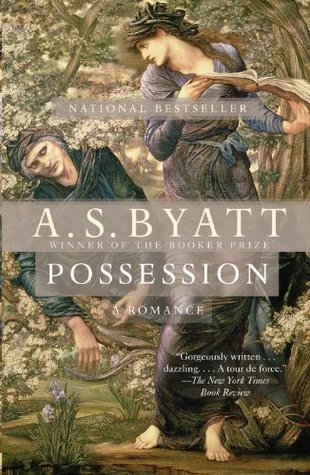More on this book
Community
Kindle Notes & Highlights
Did you not find it as strange as I did, that we should so immediately understand each other so well? For we did understand each other uncommonly well, did we not? Or is this perhaps a product of the over-excited brain of a middle-aged and somewhat disparaged poet, when he finds that his ignored, his arcane, his deviously perspicuous meanings, which he thought not meanings, since no one appeared able to understand them, had after all one clear-eyed and amused reader and judge?
But you did come out, so I may hope that you can be induced to vary your quiet days with I am sure you understand
He had liked the look of her, he remembered, a soft, brown uncertain look.
“I don’t know why you should want me, I’m no good, but you do.” “Of course I do,” Roland had said. “Of course.”
The known Ash shifted a little, and Roland felt flickers of excitement of his own. A kind of readiness. A kind of fear.
There were times when Blackadder allowed himself to see clearly that he would end his working life, that was to say his conscious thinking life, in this task, that all his thoughts would have been another man’s thoughts, all his work another man’s work.
But do not get into the habit of morbid Self-examination. Nothing so unfits a woman for producing good work, or for living usefully.
“Because they were alive. They seemed urgent—I felt I had to do something. It was an impulse.
Maud said that Leonora Stern believed it represented Victorian women’s fear, or any woman’s fear, of giving birth to a monstrosity. It was related to Frankenstein, the product of Mary Shelley’s labour pains and horror of birth.
“No. They’re beginnings. Would you like to see where she lived? And ended, indeed?”
You are the most beautiful thing I have ever seen or dreamed about. I want you, I need you, can’t you feel it, it’s irresistible.”
I trust you will feel free to reconsider the matter, and remain, if you will, alone and unwed. For me, it is enough to have seen the extraordinary gold web of your hair, and to have touched that whitest and most delicate cheek with my lips.”
I think it’s all right. A slow return to nature and oblivion.”
I am a creature of my Pen, Mr Ash, my Pen is the best of me, and I enclose a Poem, in earnest of my great goodwill towards you.
you will always get a sense that there’s something missing, something biographers don’t have access to, the real thing, the crucial thing, the thing that really mattered to the poet herself.
I don’t know why I feel so possessive about the damned things. They’re not mine.” “It’s because we found them. And because—because they’re private.”
way—it may even be that Randolph Henry’s rebuff to my ancestress’s interest gave rise to my wish to show that we were, after all, worthy to understand, and, so to speak, to entertain him.
I felt, in Tennyson’s words, that the dead man had touched me from the past: I have made my life among “Those fallen leaves which keep their green/The noble letters of the dead.”
All of us have things in our lives which we know in this brief, useful allusive way, and neglect
deliberately to explore.
She expected much of him, and he had not failed her, but feared to fail.
Was his innocence as great as hers? How had he endured, the twentieth-century mind suspiciously asks, the privations of his long wait?
What did they see in each other, those two, alone and self-absorbed, as he put his hands round her comfortable waist and lifted her to her stony throne?
It may be that this is the desire of all reading women, as opposed to reading men, who wish to be poets and heroes, but might see the inditing of poetry in our peaceful age, as a sufficiently heroic act.
Roland objected to this, partly because he felt he was being hustled, partly because he had a vision, which he now saw was ridiculous and romantic, of their two heads bent together over the manuscripts, following the story, sharing, he had supposed, the emotion.
but they exclude the reader as reader; they are written, if they are true letters, for a reader.
your intelligence, your marvellous quick wit—so that I may write to you as I write when I am alone, when I write my true writing, which is for everyone and no one—so that in me which has never addressed any private creature, feels at home with you.
I have always supposed it to be a cry of unsatisfied love—my dear—and so it may be indeed—for satisfaction may surfeit it and so it may die.
But if you wish—you may keep your gloves clean and scented and folded away—you may—only write to me, write to me, I love to see the hop and skip and sudden starts of your ink.…
here is an author of Monologues—trying clumsily to construct a Dialogue—and encroaching on both halves of it. Forgive me.


